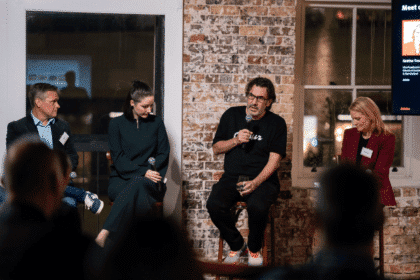Andrew May is a human performance strategist, CEO of StriveStronger and host of the NAB Business Fit Podcast, which is part of a free program to help SMEs and their staff become more resilient, transition to new ways of working and sustain physical and psychological wellbeing. In this guest post, May offers top tips for those exhausted by lockdown and Zoom meetings…
For many of us, COVID-19 has been a time of firsts: The first time we’ve had to work continuously from home, the first time we’ve had to home-school kids, the first time we’ve had to do both at the same time; the first time we’ve had to wear face masks, been unable to see our families, attend weddings and funerals and the first time many of us have experienced deep economic uncertainty. Another first you might have encountered is what is being referred to as Zoom Gloom or Zoom Fatigue.
Zoom fatigue is a real phenomenon
Conservative estimates suggest body language or nonverbal cues account for 60 to 80 per cent of communication among humans. So broad is our ability to communicate without words that humans can make and perceive about 250,000 different facial expressions.
We’ve evolved to do this, so it typically happens without much thought. But when we are prevented from communicating as we normally would – and we have all our meetings and catch-ups online – our brains have to work much harder to decipher the same information.
On Zoom – or Google Hangouts, Microsoft Teams, Skype, FaceTime, or any other video-calling interface – people are often framed from the shoulders up, limiting our ability to read nonverbal cues and therefore paint a whole and accurate picture of what is being communicated. In addition, video quality may be poor making facial expressions hard to read or leading to audio-delays and other glitches and we may be on multi-person calls, meaning we have multiple people to focus on, multiple times a day, while we work and try to socialise.
It’s hard work for our brains and can result in people feeling more fatigued than usual. This mental fatigue from online video conferencing is referred to as Zoom fatigue.
“For somebody who’s really dependent on those non-verbal cues, it can be a big drain not to have them,” Andrew Franklin, an assistant professor of cyberpsychology at Virginia’s Norfolk State University, explained to National Geographic.
Gianpiero Petriglieri is an associate professor at Insead, who explores sustainable learning and development in the workplace. Petriglieri told the BBC that during video conference calls: “Our minds are together when our bodies feel we’re not. That dissonance, which causes people to have
conflicting feelings, is exhausting. You cannot relax into the conversation naturally.” Preliminary data is showing online meetings are twice as cognitively taxing as traditional face to face meetings. I’m sure you don’t need the research, however, to tell you this after trying to drag yourself through hours of energy sapping online meetings
How to Combat Zoom Gloom
If you’re feeling overstimulated or drained, here are 6 simple strategies for managing Zoom Fatigue.
1. Try turning off your camera when you don’t need it on, having more meetings over the phone and walking while you’re on your call to reduce stress, move your body and wake up your mitochondria.
2. Limit the duration of video meetings as well as the number of them to what is essential and have breaks in between calls.
3. Go analog when you can and swap out the digital for paper books and board games, meetings or catch ups in real life. Ensure you have extended screen-free time as often as possible and create boundaries around use of technology. That means periods without scrolling social media, and time-out from binge-watching TV.
4. Notice the noise: The microphones in our devices can amplify annoying noises, like slurping or crunching, chairs scraping or even the sound of tapping on your keyboard, adding to the brain drain during video calls. Being aware of these and adjusting your position, distance from or direction of the microphone can help.
5. Write it out: jotting down your thoughts and experiences can help in identifying fears and concerns, prioritising tasks and problems and recognising triggers in our daily lives. Regular journal writing is a proven way to help manage internal thoughts and ‘make meaning’ in relation to significant changes in our lives.
6. Get out in nature and inhale some fresh air, even if it’s only for a few minutes, and reset your body and brain.









